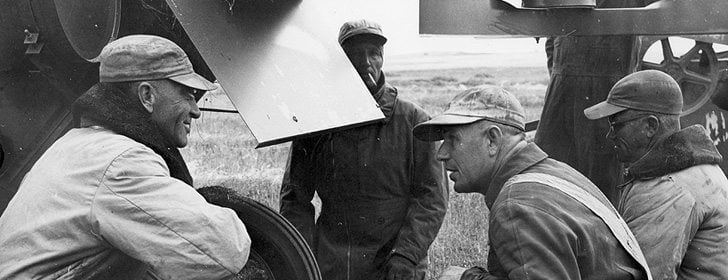Monopoly granted in 1943 | Canadian Wheat Board was once considered untouchable
Bill Hamilton, who cut his farm policy teeth working for the Saskatchewan royal commission on the future of agriculture in the 1950s, remembers one issue that was not debated.
During a wide-ranging four-year study of the province’s main industry, the role of the decade-old Canadian Wheat Board monopoly was not on the table.
“The wheat board was universally accepted and the only real debate was why it didn’t have more powers,” recalled Hamilton, a staffer for the commission who went on to a long career in farm politics with the Saskatchewan Federation of Agriculture and the Canadian Federation of Agriculture as executive director.
Read Also

Government, industry seek canola tariff resolution
Governments and industry continue to discuss how best to deal with Chinese tariffs on Canadian agricultural products, particularly canola.
“The pools were powerful and they saw the board as a necessary and effective marketing tool,” he recalled in a late-December interview. “It had no real enemies at the time.”
Six decades later, with prairie farmers deeply divided on the issue, the Conservative government of prime minister Stephen Harper appears to have engineered the demise of the single desk effective Aug. 1, 2012.
“In those days, that would have been unthinkable,” said Hamilton, born into a Saskatchewan Wheat Pool family and raised on a Siemens, Sask., grain farm. “I guess the Prairies have passed me by.”
The 2011 Conservative changes to get rid of the single desk powers of the wheat board reflects changing prairie politics and the culmination of almost four decades of growing opposition that board supporters could not extinguish.
From its uncertain beginning, the wheat board was a creature of political controversy.
Attempts to create a Canadian Wheat Board had several false starts. A board was briefly created by the Conservatives in 1919 but allowed to disappear the next year.
The real father of the CWB was Conservative prime minister R.B. Bennett, who introduced legislation and personally shepherded it through the House of Commons and a Commons committee in the summer of 1935 in the face of fierce Liberal opposition.
Bennett was an unlikely advocate: a millionaire capitalist and grain elevator company owner who became convinced the grain trade was dysfunctional and needed a collective, government-created marketer to protect the farm economy.
William Lyon Mackenzie King, in opposition, fought the legislation as an intrusion on free enterprise and forced Bennett to drop his plans for a compulsory marketing board in favour of voluntary.
Three months later, prairie farmers who had argued for a wheat board had their say.
In the 1935 election, the prairie seat count was seven Conservatives and 34 Liberals. Then as now, the CWB does not seem to have been a ballot issue for most farmers.
Ironically, it was King who conferred monopoly powers on the CWB in 1943 as part of the wartime effort.
The board was unchallenged through the 1950s and 1960s and became a key instrument of Canadian foreign policy in 1961 when it negotiated the first western nation grain sale to the Peoples’ Republic of China, a breakthrough in relations with the communists that was encouraged and aided by then-Progressive Conservative agriculture minister Alvin Hamilton.
“The wheat board recognized China before Canada did,” later Liberal CWB minister Otto Lang once said.
But by the mid-1970s, criticism began to be heard.
The Palliser Wheat Growers’ Association became the first vocal, if small, farm group to challenge both wheat board and Saskatchewan Wheat Pool orthodoxy on the benefits of the monopoly.
The western provinces got involved.
As early as 1969, conservative Liberal Saskatchewan premier Ross Thatcher tried to bypass the board by bartering unsold and cheap provincial wheat for foreign goods. Lang shot him down, but soon Alberta premier Peter Laughed was demanding that provinces have a say over what he considered to be an ineffective CWB export strategy.
In 1979, the minority government of Joe Clark weighed in with a report about CWB problems, and the Conservative Manitoba government piled on.
By the 1980s, United Grain Growers had become the first major farmer grain co-operative to come out against the board monopoly ,and in 1989, then-PC minister Charlie Mayer took oats out of board jurisdiction.
The 1990s produced Liberal Ralph Goodale’s CWB reform that created a majority-elected board of directors and farmer control of the board for the first time. However, his 1998 legislation left significant powers with the federal government to intervene, which Ritz used to full effect.
Meanwhile, the politics of monopoly opposition had become mainstream.
In 1993, the anti-CWB monopoly Reform party became the major voice of the Prairies in Parliament. By 1997, the diminished Progressive Conservative party also vowed to end the monopoly.
A key milestone on the road to the end of the monopoly came last decade when the prairie wheat pools collapsed, eliminating the strongest supportive farmer lobby. General farm organizations, recognizing a growing split in their membership, found a fence to mount.
With diminishing farm sector supporters, the CWB pro-monopoly directors, who were voted for by the same farmers who elected Conservative and Reform MPs, tried to morph into a farm group that lobbied for their own interest. It led to more criticism and a flurry of conservative think-tanks arguing that the board was not effective.
The 2006 election of a minority Conservative government, with its long-standing vow to end the monopoly, increased the pressure.
Election of a majority Conservative government in May 2011 sealed the board’s fate.
“If I was a Canadian Wheat Board director, I’d be packing my bags,” University of Regina political scientist Howard Leeson said on election night May 2.
He was right. They were told to pack their bags Dec. 16 when the Bill C-18 became law, although court challenges remain.

















